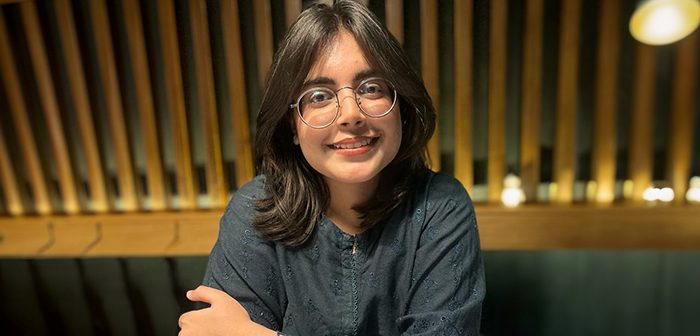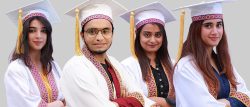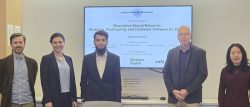Arooma Naqvi, a graduate of Habib University’s Social Development and Policy (SDP) from Class of 2021, is committed to dismantling barriers that prevent women from thriving in a rapidly changing world. Through her work in digital inclusion, Arooma is not just addressing systemic challenges but actively creating spaces where women can flourish. As Program Manager at CaterpillHERs, she designs and leads programs that empower women to navigate the digital realm confidently, unlocking new opportunities for professional and entrepreneurial growth.
Reflecting on her time at Habib University, Arooma credits the SDP program’s interdisciplinary approach for shaping her understanding of development issues. “When I joined Social Development and Policy as a program, I really liked how it was structured, at least at our time. It made a lot of sense and was sort of like building blocks,” she explains. The program introduced her to foundational concepts, progressively equipping her with the practical tools necessary for addressing real-world challenges in areas such as public policy, research methods, and program design.
One pivotal experience was the Introduction to Program Planning and Design course, which directly influences her work today. “Most of my work—around 70%—is program development and design, with some implementation,” she says, highlighting how this course helped her understand the complexities of creating practical, effective solutions.
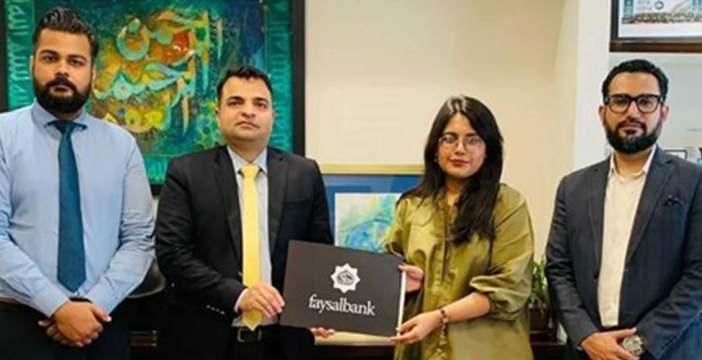
MoU signing ceremony with Faysal Bank. This collaboration aims to promote financial literacy and inclusion for CaterpillHERs’ beneficiaries and program participants by providing them with the knowledge and tools needed for financial independence.
Building on this foundation, Arooma leads initiatives at CaterpillHERs that address the pressing issues of digital exclusion and gender disparity. These programs equip women with the skills to establish their digital presence, expand their businesses online, and connect with broader networks. Her approach, shaped by a deep understanding of local cultural contexts, goes beyond teaching digital tools. “In Pakistan, women face unique barriers, not just in accessing technology, but in navigating societal perceptions of their roles online,” she explains. Arooma’s work also encourages communities to advocate for women’s active participation in the digital space, helping shift mindsets alongside providing digital skills.
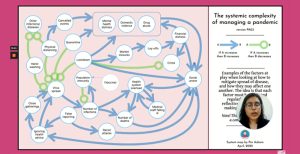
Arooma delivering a virtual lesson on systems mapping, part of the Social Entrepreneurship module of the CaterpillHERs’ Greater Good Accelerator. The 14-week accelerator trained 22 women, equipping them to build sustainable, impact-driven ventures.
Arooma’s career has been defined by a strong commitment to development and policy, further honed during her time at Green Box, where she contributed to a cross-sectional study on youth perspectives on climate action across South Asia. This project, conducted in partnership with the British Council, culminated in a presentation at COP26 and marked a key milestone in her professional journey. “Interacting with people from Afghanistan, Sri Lanka, and Bangladesh gave me valuable insights into regional issues. It was also my first publication, which made the experience even more rewarding,” she recalls.
At CaterpillHERs, Arooma is also working to combat technology-facilitated gender-based violence (TFGBV). By integrating digital literacy with tools to enhance online safety, she is working towards creating an environment where women can protect themselves from online harassment while maintaining their digital presence. “We’re not just teaching women how to use digital tools—we’re helping them reclaim their agency in the digital space,” she explains.
Arooma has also contributed significantly to enabling a culture of research and academic rigor at her alma mater. After graduation, she stayed connected with her academic program and served as Conference Coordinator for Aamozish-e-Tehqeeq, a flagship climate conference. This initiative became an active platform for undergraduate students to engage in evidence-based research, bridging the gap between academia and real-world development challenges in Pakistan.
In Pakistan, despite strong legislation on issues like domestic violence and digital privacy, the gap between law and implementation remains vast. Arooma points to this as a critical challenge, noting that while policies exist, their enforcement and public awareness are often lacking. “The laws are there, but without enforcement and public awareness, they remain ineffective,” she explains, emphasizing that her education has given her the tools to address these gaps through localized interventions.
Arooma’s journey from academic theory to on-the-ground impact showcases the power of interdisciplinary education and a passion for social development. As she continues to break down barriers and empower women in Pakistan, her work reflects a broader vision of a world where technology is not just a tool but a space for women’s agency, growth, and leadership.

